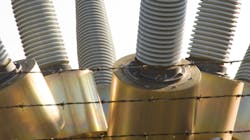DOE Opens Call for Deployable Solutions to Secure America's Power Grid
The U.S. Department of Energy (DOE) and the National Renewable Energy Laboratory (NREL) yesterday announced a call for applications for the second cohort of the Clean Energy Cybersecurity Accelerator (CECA) program
The program brings together federal experts, energy industry representatives, and innovators in a unified effort to rapidly develop cybersecurity solutions for renewable energy resources and other grid operations and to bring them to market faster. CECA is a key component of DOE’s strategy to ensure America’s critical energy infrastructure remains reliable, resilient, and secure as more renewable energy is incorporated into the generation mix to achieve President Biden’s ambitious vision of a 100% clean electricity sector by 2035 and net-zero economy by 2050.
“As physical and virtual threats to our critical energy infrastructure continue to evolve, DOE is using all the tools at our disposal to lock down cybersecurity vulnerabilities of today and tomorrow,” said U.S. Secretary of Energy Jennifer M. Granholm. “By supporting new, innovative technologies, the CECA program will help bring cutting-edge solutions to market more rapidly—ensuring our nation’s electric grid is secure and reliable as it transitions to 100% clean energy.”
For its second cohort, CECA seeks applicants with solutions that actively identify all industrial control system assets connected to a utility's infrastructure, both physically and virtually, to understand the totality of assets that need to be monitored and protected within the environment. The solutions should support the identification of unauthorized, unmanaged, or compromised assets to be removed or remediated. During a period of three to 12 months, cohort participants will receive professional evaluations of their technologies and partnership opportunities while developing and evaluating cyber-risk solutions in a collaborative setting.
As part of the CECA program, DOE and NREL have partnered with Berkshire Hathaway Energy, Duke Energy, and Xcel Energy in a joint effort to tackle the growing cyber threats to the U.S. energy sector, and other utilities are invited to join. The partnering utilities may use the cohort’s cybersecurity technologies once they are assessed and validated and will also gain insights from the technology developers on the latest cyber challenges, best practices, trends, and the ability to understand cyber technology solutions.
In December 2022, DOE and NREL announced the CECA program’s first cohort—three participants with cyber-defense technologies unproven in energy systems to authenticate distributed energy resources. The three participants have recently started a technical assessment of their technologies and will have the opportunity to showcase their solutions using NREL’s world-class laboratory facilities.
